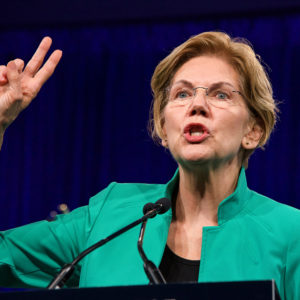In the wake of the Gamestop trading frenzy, in which individual retail investors banded together to drive Gamestop Corp. (GME) shares up 1500% in recent weeks, Sen. Elizabeth Warren released a statement blaming hedge funds for eroding the financial system by allowing “gambling.”
Retail investors, collaborating on Reddit chatroom Wallstreetbets, were attempting to short squeeze hedge funds that had shorted Gamestop’s stock, believing the company was overvalued. When trading volumes on margin became too high for retail brokerage firms such as Robinhood, TD Ameritrade, and others to post sufficient collateral to clearinghouses, trading was halted.
In response, Gamestop investors cried foul, along with some policymakers in Washington.
Warren released a statement, “For years, the same hedge funds, private equity firms, and wealthy investors dismayed by the GameStop trades have treated the stock market like their own personal casino while everyone else pays the price.”
Sen. Bernie Sanders was equally damning of Wall Street, stating “We have to take a very hard look at the kind of illegal activities and outrageous behavior on the part of the hedge funds and other Wall Street players.”
These statements reveal a lack of understanding about hedge funds and their purpose.
Hedge funds are investment vehicles comprised of pooled capital from institutional investors and accredited investors. Institutional investors are professional investors who manage large sums of money for pension funds, sovereign wealth funds, corporations, government workers, and labor unions. Accredited investors are individuals who have at least one million dollars in net worth or have an annual income of over $200,000 for the last two years ($300,000 jointly with a spouse).
The purpose of these requirements isn’t to “favor the rich” by “cordoning off” investment opportunities as Representative Alexandria Ocasio-Cortez (AOC) would have people believe. On the contrary, these regulations are to protect individual investors by excluding those who are unable to bear potentially large losses from risky investments.
Originally introduced following the Great Depression, these laws are meant “to ensure that all participating investors are financially sophisticated and able to fend for themselves or sustain the risk of loss” according to the SEC.
Hedge funds are allowed to invest in a wide range of securities and employ leverage. Generally, the goal of the hedge fund is to produce returns that are uncorrelated to the market, thus “hedging” an investor’s overall portfolio. For example, if the traditional markets such as the S&P 500 and the NASDAQ were to go down, the intent would be that the hedge fund would still be generating positive returns, offsetting those losses.
By including hedge funds as part of a diversified portfolio, investors seek to maximize and protect returns by reducing volatility. Because hedge funds are able to trade options, futures contracts, and derivatives and trade on margin (significantly increasing downside exposure), they are higher risk-return investments than some others. Investors could potentially lose their entire investment, as was the case with Long Term Capital Management. Most institutional and accredited investors only invest between 10-20 percent of their assets in hedge funds.
Hedge funds generally short sell a stock when they believe the value of a company is either too high or is going to go down. In the case of Gamestop, the pandemic’s punch was a double-whammy: Fewer people at the mall shopping in their stores and more people at home downloading games online. It’s no surprise the hedge funds like Melvin Capital were betting against Gamestop’s future.
The response from the individual investors, the so-called RobinHood or Reddit day traders, wasn’t a calculated investment in Gamestop’s future, but rather a short-term attempt to make some quick money through volatility in the price of the stock. Their investments were not based on any kind of investment thesis regarding the valuation of the company or the viability of the business model.
If there were any “gamblers” involved in the Gamestop incident, it was the individual retail investors, some of whom could still end up losing their retirement funds when the bubble bursts. Keith Gill, one of Wallstreetbets’ earliest Gamestop investors, lost $13.6 million on February 2. Because he was one of the first investors and got in at a low price, he still has a net gain on the position. But not everyone will be so lucky.
Hedge funds are a tool for diversifying investment portfolios, including those held by pension funds, government employees, and unions, which benefit regular Americans. The restrictions placed on who can invest in hedge funds are not intended to keep smaller investors out, but rather to protect them from potentially ruinous losses.
Senator Sander’s accusation of “illegal activities” is unfounded thus far. Senators Sanders and Warren, and AOC’s inflammatory language is misleading. In this new era of no-fee online brokerage and investor chatrooms, Biden’s new SEC Chairman, Gary Gensler, will most likely evolve the regulatory framework to protect markets from this kind of irrational exuberance.

